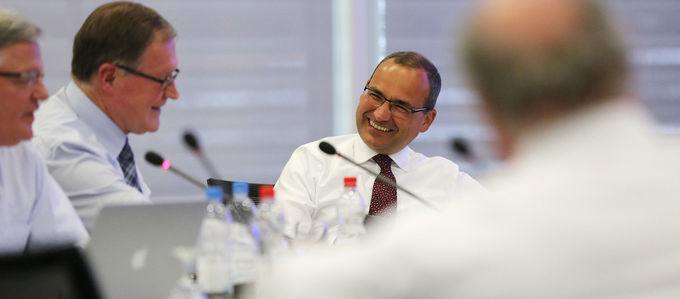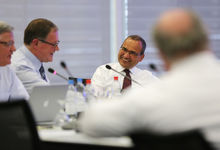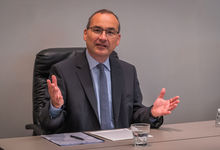Together and well-positioned for the future
Christ comes before the Church, the gospel before rules, salvation of the soul before tradition. In June 2018, the Chief Apostle gave an exclusive interview and answered the question, “Quo vadis, NAC?” Following are the most important excerpts from the three-part interview.

The strategic guidelines
Our primary goal is to preach the gospel truthfully and conscientiously throughout the world. For us as Apostles, this means the following.
- We need to be careful that Jesus Christ takes first place, and not the institution or a particular person.
- We want to define the New Apostolic doctrine on the basis of the Bible. This is the purpose of our Catechism.
- We want to make sure that the sermons correspond to the biblical message and the doctrine.
- We want to give priority to that which is decisive for the salvation of the believers. We want to clearly distinguish between the message of the gospel, the rules of the Church, and local traditions.
- We need to make sure that all New Apostolic children across the globe receive quality religious education that is adapted to their needs and local conditions. All of our Church-related activity must be defined by this focus on the gospel of Jesus Christ.
Cultural diversity
In the past, when our Church was only beginning to spread and grow around the world, we thought it was important to put the focus on uniformity. We encouraged believers to follow certain apostolic “patterns” in such things as music, dress, teaching methods, or even organisational aspects. Today we know that this approach was not the best, and increasingly try to take cultural differences into account. The New Apostolic faith can be practised within the most diverse of cultures.
The reorganisation of the ministerial hierarchy
Our goals are
- to define our understanding of ministry on the basis of biblical record, without allowing ourselves to get carried away with interpretations that have more to do with tradition than actual exegesis.
- to clearly distinguish between organisational responsibilities and the exercise of ministerial authority conferred by God through ordination.
- to enhance the competence of the believers irrespective of ministry.
- to adapt our structure to the current needs, by making it more efficient, more comprehensible, and more flexible.
- to introduce instruction and training in general.
- and—generally speaking—to put emphasis on the notion of serving.
The principle of shared leadership
In today’s world it is no longer conceivable for a global church such as ours to be led by a single man. Rather, decisions must be made in a collaborative fashion. I feel it is important to shape the District Apostle Meeting into a true governing body of the Church. Every member of this board must be able to express himself freely and contribute to collective solutions. We have already made progress in this area, and I am very pleased.
Shared leadership also requires certain rules. If the District Apostles are to be fully involved in the governance of the Church, their number cannot be too large. That is why we have started to reduce the number of District Apostles in Europe, for example. In addition, we have established the Coordination Group and the Finance Committee. These consist of several District Apostles who act on behalf of the District Apostle Meeting and support the Chief Apostle in his work.
There are similar approaches at the level of the District Churches. Over the last few years, the role and the decision-making power of the governing bodies have been clearly defined and, where necessary, reinforced. Some congregations have even established congregational councils and committees in order to involve the members in organising the activities in the congregation. We will likely see more such solutions in future.
Photo: Oliver Rütten
Article info
Author:
Date:
Keywords:
Andreas Rother
29.12.2018
Chief Apostle,
Doctrinal statements,
Doctrinal instruction,
Congregational life









